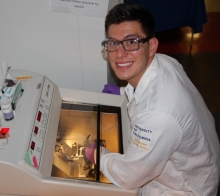
Major:
Mentor(s):
Faculty Sponsor(s):
Faculty Sponsor's Department(s):
Project Title:
Project Description:
Retinal photoreceptor cell degeneration is a common cause of blindness in diseases such as retinitis pigmentosa that currently have no cure. Our research involves analyzing the neuroprotective effects of a single intravitreal injection of human Retinal Progenitor Cells (hRPCs) into the RCS rat, an animal model of photoreceptor degeneration that has been well characterized. The degeneration occurs on a highly predictable time scale, hence it is an excellent animal model to examine the protective effects of therapies such as hRPCs. To date, we have observed that the hRPCs remain viable in the vitreous for at least 2 months after injection and slows the loss of photoreceptor cells in the Outer Nuclear Layer (ONL). Immunohistochemical staining was used to detect proteins expressed by the progenitor-cells to indicate the level of maturity, type of cell and location in the eye. While the hRPCs do begin to express some adult proteins over time, this does not appear to interfere with the rescue effects nor have any adverse effects in the eye. In addition we found no evidence of the hRPCs integrating into the retina. Based on tissue culture studies, we know that the cells secrete 9 specific growth factors; hence, these growth factors are most likely the source of this rescue effect. Since the cells remain viable for months after injection into the eye, we feel that the hRPCs can serve as a continuous source of these growth factors, slowing the loss of photoreceptor cells in the ONLthus preserving vision.
